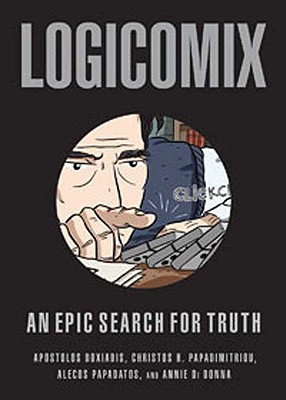In today's post, regular contributor Bonnie Brzozowski talks about the complex and thought-provoking graphic novel discussed at this month's Graphic Novels Book Club at the Austin Public Library.
 The October pick for Austin Public Library’s Graphic Novels Book Club was LOGICOMIX: AN EPIC SERACH FOR TRUTH by Apostalos Doxiadis and Christos Papadimitriou, a comic that takes on the subjects of Bertrand Russell, logic, and ultimate truth. Odd subject matter for a comic perhaps, but excellent fodder for discussion: we discussed topics such as the development of the fields of logic and mathematics at the turn of the 20th century, the relation of logic to madness, and whether or not ultimate truth is obtainable. The story follows Russell from boyhood to adulthood and provides an intimate portrait of the man himself as well as the ideas for which he is known.
The October pick for Austin Public Library’s Graphic Novels Book Club was LOGICOMIX: AN EPIC SERACH FOR TRUTH by Apostalos Doxiadis and Christos Papadimitriou, a comic that takes on the subjects of Bertrand Russell, logic, and ultimate truth. Odd subject matter for a comic perhaps, but excellent fodder for discussion: we discussed topics such as the development of the fields of logic and mathematics at the turn of the 20th century, the relation of logic to madness, and whether or not ultimate truth is obtainable. The story follows Russell from boyhood to adulthood and provides an intimate portrait of the man himself as well as the ideas for which he is known.
Russell was preoccupied with demonstrable knowledge from a very early age. His studies as a youth and university student only solidified his belief that mathematics, in particular, must be based on provable axioms. It was in his infamous
Principles of Mathematics that Russell set out to define those axioms, only to discover years later that the longer he contemplated logic and mathematics the further he was from anything demonstrable or provable. He eventually conceived what is now known as Russell’s Paradox, which stripped mathematics of the foundations Russell and other mathematicians such as
Gottlob Frege were trying to build. The discovery of the Paradox turned logic and mathematics on its head (to demonstrate the gravity, it sent Frege into a deep depression) and contributed greatly to the future development of the field.
As a layperson with one loathed Intro to Philosophy course under my belt, the ideas in this book were new to me and I had to stop every now and then and contemplate what was introduced. Luckily, the book is also interested in Russell as a person and included his personal thoughts and events from his personal life that provided insight into Russell’s character. But it is truly Russell’s ideas that reveal the most about him. His original belief that all knowledge is knowable and provable and his incredible drive to demonstrate this certainly provide insight into Russell’s mind and motivations. His eventual acceptance of the idea that there are things that cannot be known and, consequently, schools of thought based on unknown factors is a key element of the story. The intensity of spending years upon years of your life contemplating unknowns and only getting further away from the truth can literally be maddening and this theme is touched on repeatedly throughout the book. Russell had many people in his immediate family that succumbed to mental illness and there are many examples of logicians, like Frege mentioned above, descending into madness.
In sum, this was a complex and challenging book to discuss, but a very rewarding one in terms of the ideas we were able to explore together as a group and the greater appreciation I think we all acquired for the known vs. the unknown. We ended up agreeing that despite all the contemplation in the world Socrates was probably closest to ultimate truth when he stated, “I know that I know nothing.”
-- Bonnie Brzozowski, Reference Librarian - Austin Public Library
 The October pick for Austin Public Library’s Graphic Novels Book Club was LOGICOMIX: AN EPIC SERACH FOR TRUTH by Apostalos Doxiadis and Christos Papadimitriou, a comic that takes on the subjects of Bertrand Russell, logic, and ultimate truth. Odd subject matter for a comic perhaps, but excellent fodder for discussion: we discussed topics such as the development of the fields of logic and mathematics at the turn of the 20th century, the relation of logic to madness, and whether or not ultimate truth is obtainable. The story follows Russell from boyhood to adulthood and provides an intimate portrait of the man himself as well as the ideas for which he is known.
The October pick for Austin Public Library’s Graphic Novels Book Club was LOGICOMIX: AN EPIC SERACH FOR TRUTH by Apostalos Doxiadis and Christos Papadimitriou, a comic that takes on the subjects of Bertrand Russell, logic, and ultimate truth. Odd subject matter for a comic perhaps, but excellent fodder for discussion: we discussed topics such as the development of the fields of logic and mathematics at the turn of the 20th century, the relation of logic to madness, and whether or not ultimate truth is obtainable. The story follows Russell from boyhood to adulthood and provides an intimate portrait of the man himself as well as the ideas for which he is known.
